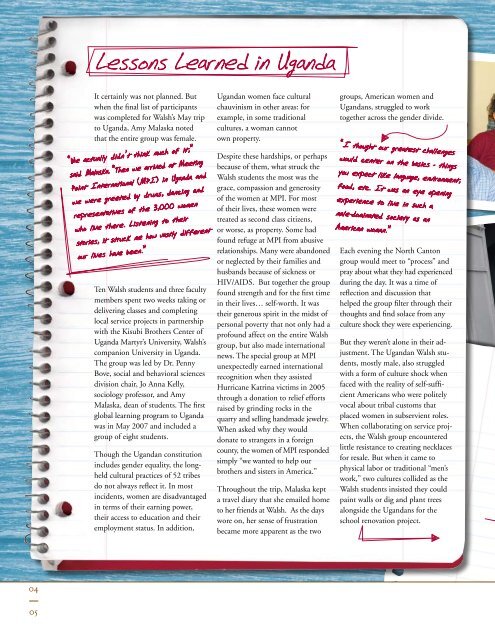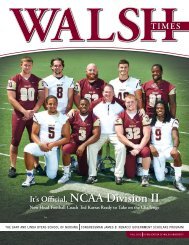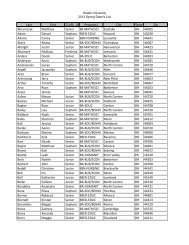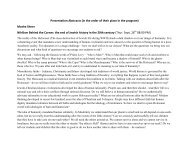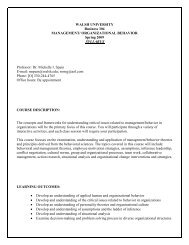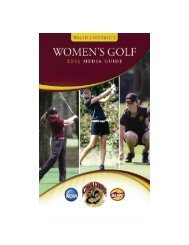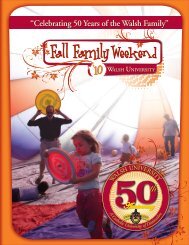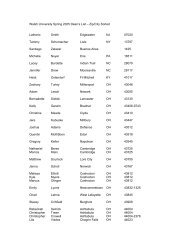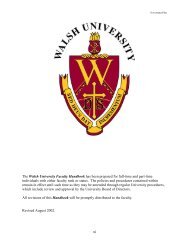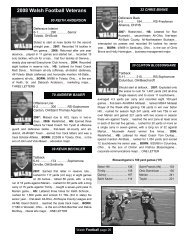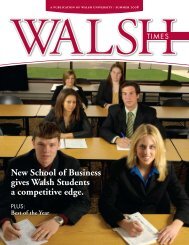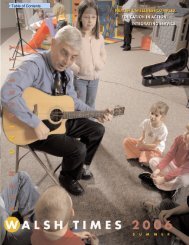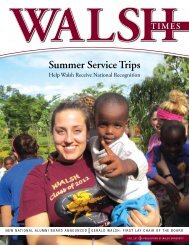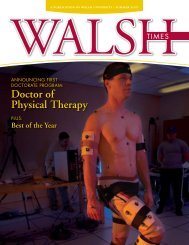Record-setting Freshman Class Enters Walsh University
Record-setting Freshman Class Enters Walsh University
Record-setting Freshman Class Enters Walsh University
Create successful ePaper yourself
Turn your PDF publications into a flip-book with our unique Google optimized e-Paper software.
Lessons Learned in Uganda<br />
It certainly was not planned. But<br />
when the final list of participants<br />
was completed for <strong>Walsh</strong>’s May trip<br />
to Uganda, Amy Malaska noted<br />
that the entire group was female.<br />
“We actually didn’t think much of it,”<br />
said Malaska. “Then we arrived at Meeting<br />
Point International (MPI) in Uganda and<br />
we were greeted by drums, dancing and<br />
representatives of the 3,000 women<br />
who live there. Listening to their<br />
stories, it struck me how vastly different<br />
our lives have been.”<br />
Ten <strong>Walsh</strong> students and three faculty<br />
members spent two weeks taking or<br />
delivering classes and completing<br />
local service projects in partnership<br />
with the Kisubi Brothers Center of<br />
Uganda Martyr’s <strong>University</strong>, <strong>Walsh</strong>’s<br />
companion <strong>University</strong> in Uganda.<br />
The group was led by Dr. Penny<br />
Bove, social and behavioral sciences<br />
division chair, Jo Anna Kelly,<br />
sociology professor, and Amy<br />
Malaska, dean of students. The first<br />
global learning program to Uganda<br />
was in May 2007 and included a<br />
group of eight students.<br />
Though the Ugandan constitution<br />
includes gender equality, the longheld<br />
cultural practices of 52 tribes<br />
do not always reflect it. In most<br />
incidents, women are disadvantaged<br />
in terms of their earning power,<br />
their access to education and their<br />
employment status. In addition,<br />
Ugandan women face cultural<br />
chauvinism in other areas: for<br />
example, in some traditional<br />
cultures, a woman cannot<br />
own property.<br />
Despite these hardships, or perhaps<br />
because of them, what struck the<br />
<strong>Walsh</strong> students the most was the<br />
grace, compassion and generosity<br />
of the women at MPI. For most<br />
of their lives, these women were<br />
treated as second class citizens,<br />
or worse, as property. Some had<br />
found refuge at MPI from abusive<br />
relationships. Many were abandoned<br />
or neglected by their families and<br />
husbands because of sickness or<br />
HIV/AIDS. But together the group<br />
found strength and for the first time<br />
in their lives… self-worth. It was<br />
their generous spirit in the midst of<br />
personal poverty that not only had a<br />
profound affect on the entire <strong>Walsh</strong><br />
group, but also made international<br />
news. The special group at MPI<br />
unexpectedly earned international<br />
recognition when they assisted<br />
Hurricane Katrina victims in 2005<br />
through a donation to relief efforts<br />
raised by grinding rocks in the<br />
quarry and selling handmade jewelry.<br />
When asked why they would<br />
donate to strangers in a foreign<br />
county, the women of MPI responded<br />
simply “we wanted to help our<br />
brothers and sisters in America.”<br />
Throughout the trip, Malaska kept<br />
a travel diary that she emailed home<br />
to her friends at <strong>Walsh</strong>. As the days<br />
wore on, her sense of frustration<br />
became more apparent as the two<br />
groups, American women and<br />
Ugandans, struggled to work<br />
together across the gender divide.<br />
“I thought our greatest challenges<br />
would center on the basics – things<br />
you expect like language, environment,<br />
food, etc. It was an eye opening<br />
experience to live in such a<br />
male-dominated society as an<br />
American woman.”<br />
Each evening the North Canton<br />
group would meet to “process” and<br />
pray about what they had experienced<br />
during the day. It was a time of<br />
reflection and discussion that<br />
helped the group filter through their<br />
thoughts and find solace from any<br />
culture shock they were experiencing.<br />
But they weren’t alone in their adjustment.<br />
The Ugandan <strong>Walsh</strong> students,<br />
mostly male, also struggled<br />
with a form of culture shock when<br />
faced with the reality of self-sufficient<br />
Americans who were politely<br />
vocal about tribal customs that<br />
placed women in subservient roles.<br />
When collaborating on service projects,<br />
the <strong>Walsh</strong> group encountered<br />
little resistance to creating necklaces<br />
for resale. But when it came to<br />
physical labor or traditional “men’s<br />
work,” two cultures collided as the<br />
<strong>Walsh</strong> students insisted they could<br />
paint walls or dig and plant trees<br />
alongside the Ugandans for the<br />
school renovation project.<br />
0<br />
05


